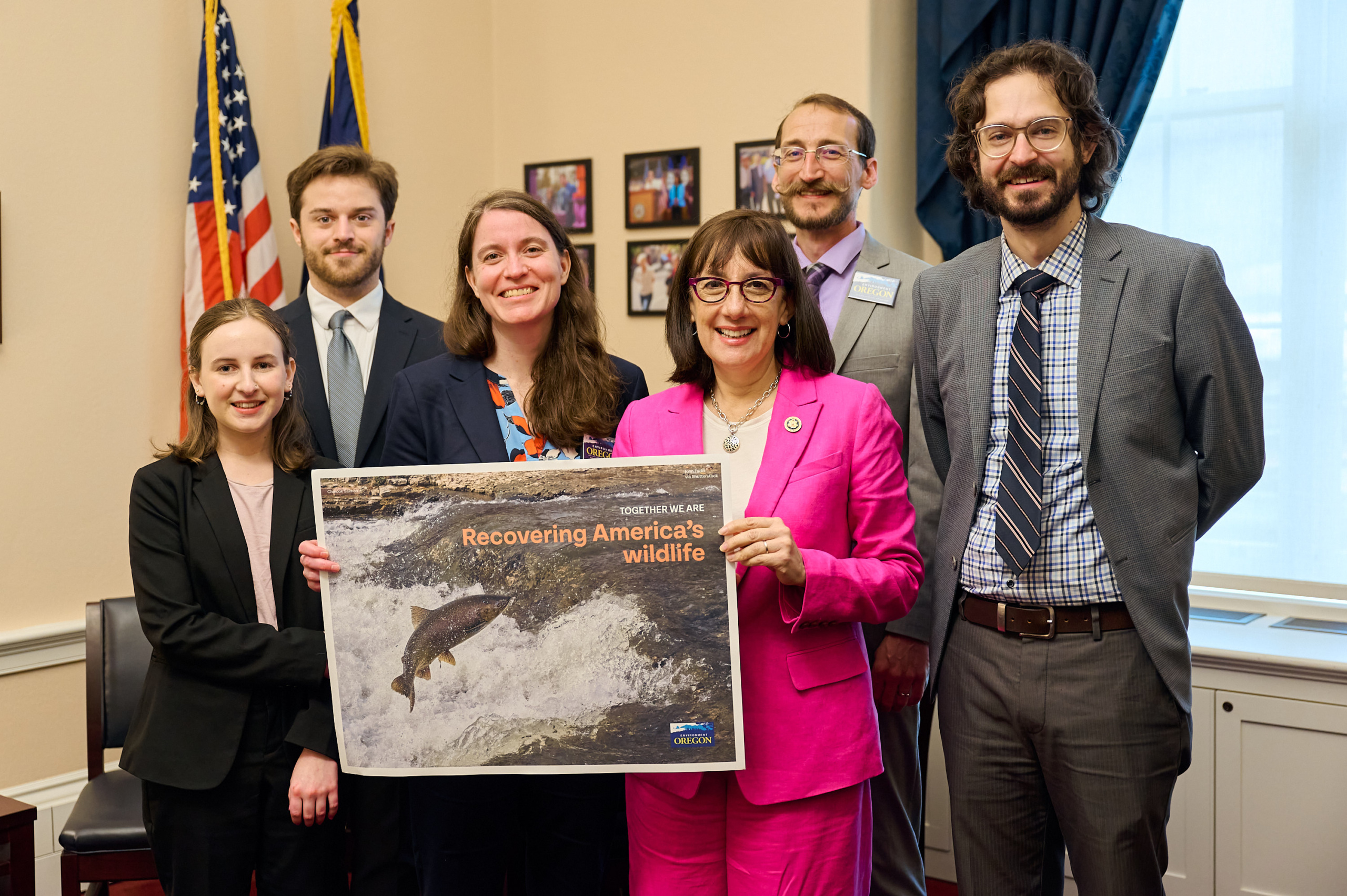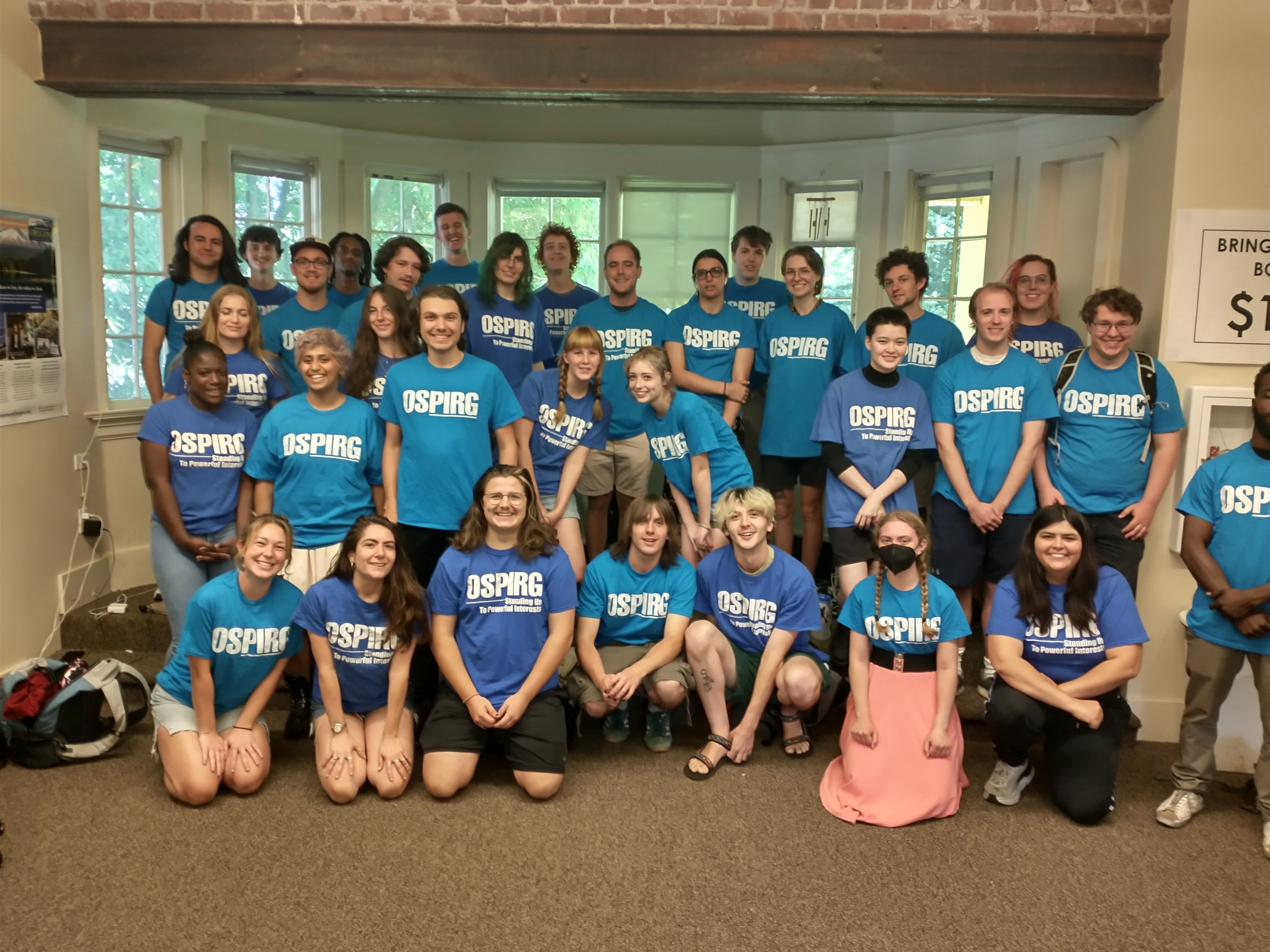
OSPIRG’s 2021 Legislative Session Recap
See what the legislature passed this year to protect the public interest and what more needs to be done.

After months of remote committee hearings and lobby meetings, the Oregon legislature adjourned at the end of June. Even though it was remote, the public made their voice heard. Hundreds of OSPIRG members and supporters sent emails and made phone calls and many of them also shared their experience with the high cost of health care. We entered the session with an ambitious legislative agenda focused on reducing the cost of health care, protecting consumers, moving towards zero waste, and more.
While we didn’t accomplish everything we set out to, I’m proud to share the progress the legislature made towards our public interest priorities.
High Value Health Care
HB 2010 – A Public Option for Oregon: Oregonians who get their health insurance from the Marketplace have seen a 71% increase in premiums since 2013, adding to the already high cost of health care. A public option would create a lower-cost choice for consumers while also helping to drive competition in the market. HB 2010 directs two state agencies, the Department of Consumer and Business Services and the Oregon Health Authority, to develop an “implementation plan” for a public option in Oregon and present it to lawmakers ahead of the 2022 legislative session.
HB 2362 – Oversight for Health Care Consolidation: Over the last 20 years, the number of independent hospitals and physicians in Oregon has dropped as large hospital systems have bought up small, independent providers. Unfortunately, health care mergers and acquisitions like these frequently lead to higher prices for patients, usually do not improve the quality of care, and can even restrict access to services. HB 2362 requires health care providers to show that they will reduce costs for consumers or increase access to care before they are allowed to consolidate.
HB 2081 – Health Care Cost Growth Accountability: Oregon health care spending grew at the 4th highest rate in the nation from 2009-2014. From 2013 to 2017, spending per person increased nearly 29%. These high health care costs translate to more expensive health care services and insurance, meaning Oregonians pay more for the same or fewer services. HB 2081 takes the next step in implementing a cost growth target program that sets goals to slow the rising cost of health care and accountability measures for reaching them.
Reining in Prescription Drug Costs
SB 844 – Prescription Drug Affordability Board: One of the biggest takeaways from Oregon’s Prescription Drug Price Transparency program is that prescriptions still cost too much. The top five most expensive brand name prescriptions that had a price increase in 2020 were between $23,000-$43,000 per prescription. SB 844 puts Oregon on the path to actually reining in those high prices by setting up a new state body, the Prescription Drug Affordability Board (PDAB). The PDAB will be empowered to review individual, high-cost drugs and evaluate whether they pose an affordability challenge for Oregonians. It is also directed to recommend to the legislature whether it should be given authority to set an “Upper Payment Limit,” essentially the maximum amount anyone would pay for the specific drug in the state. While we were disappointed the legislature didn’t initially give the PDAB this authority, we will continue to push to have it included in future sessions.
SB 763 – Pharmaceutical Sales Representative Transparency: A 2020 report found that the most common way manufacturers reported marketing their drugs to health care professionals was through a private sales pitch by a pharmaceutical sales representative.. These sales meetings are largely unregulated, closed-door conversations aimed at convincing a provider to purchase their products and prescribe them. SB 763 requires sales reps to register with the state and report on their interactions with health care providers.
Higher Education
SB 485 – Student Borrower Bill of Rights: While college attendance has grown over the past two decades, state appropriations and federal aid have failed to keep pace with the rising cost of college, shifting more costs to students. As a result, more students than ever rely on student loans to pay for a college degree, with the average borrower now graduating with over $26,000 in loan debt. SB 485 requires that loan servicers, the companies that many borrowers interact with directly, register with the state and follow basic consumer protections such as promptly fixing errors about borrowers and a prohibition on any misleading or deceptive practices. It also sets up a student loan ombudsman in state government, who is tasked with helping borrowers navigate student loan repayment.
HB 2919 – Textbook Price Transparency: Textbooks are expensive – unnecessarily so. Over the past four decades, the price of books has increased three times faster than inflation, trailing shortly behind the cost of tuition itself. The hundreds of dollars students must spend on textbooks often comes out-of-pocket and can be a serious barrier to student success. HB 2919 requires colleges and universities to display the costs of textbooks when students register for classes so they know what their expenses will be before they enroll.
HB 2835 – Basic Needs Navigators: No one should be hungry or homeless when we have more than enough food and housing for everyone, but unfortunately 40% of college students experience food insecurity. HB 2835 helps address this by establishing a point person on each campus to connect students to resources and programs to help them meet their basic needs.
Government Transparency
SB 500 – Public Records Advocate Independence: Oregonians have a right to know how government decisions are made and how taxpayer dollars are spent. Ensuring government transparency enables us to hold elected officials accountable and push back more effectively when powerful interests try to game the system.The Public Records Advocate position was created several years ago in order to give the public greater recourse when government agencies are reluctant or slow to release information. SB 500 strengthens the role of the Public Records Advocate by ensuring they are independent from any political influence that might create a conflict of interest.
Zero Waste
SB 582 – Recycling Modernization: For decades, we’ve all had to pay the costs associated with plastic pollution: The cost of disposing of it; the public health costs of pollution from plastic trash in our incinerators and landfills; and the incalculable cost that plastics are inflicting on our environment. Yet somehow, producers of wasteful single-use plastic products have avoided paying up. SB 582 makes much needed improvements to our recycling system to make it work better for Oregon and ensure better environmental outcomes. It also sets up a “shared responsibility” system in which producers of packaging, paper products and food serviceware will start bearing some of the costs of the waste management system.
Public Health
HB 2261 – Ending online sales of vaping products: The U.S. Surgeon General has declared e-cigarette use, commonly known as vaping, among young people an epidemic due to its popularity and health risks. One in five high schoolers reported vaping in 2018, a nearly 80 percent increase in one year. An entire generation is at risk of nicotine addiction, and millions of kids are already hooked on nicotine with serious implications for their health and future. HB 2261 bans online and other remote sales of vaping products, making it more difficult for underage users to purchase vaping devices and e-liquids.
Missed opportunities
Banning Pay For Delay: While the legislature did make progress on prescription drug costs, they failed to move one important reform forward that would help prevent pharmaceutical manufacturers from paying generic manufactures not to develop a cheaper generic version of their brand name drug for a period of time. Otherwise known as “pay for delay,” this practice has meant the delayed entry into the market of cheaper generic versions of well known drugs like Adderall, Lipitor, and Zantac, leading to billions of dollars in additional costs to consumers. SB 764 would have made it easier for the Oregon Attorney General to hold companies accountable when they engage in pay-for-delay schemes. We will continue to work to address this anticompetitive behavior by drug companies.
Right to Repair: Right to Repair makes it easier for consumers to fix their electronics and appliances by requiring manufacturers to release replacement parts, tools, and repair schematics to the public and independent repair businesses. Despite two public hearings, in which local organizations and small businesses rebutted misinformation from corporate lobbyists representing out-of-state companies, the House Committee on Business & Labor ultimately did not move Right to Repair (HB 2698) forward. We are committed to continue to push for Oregonians’ Right to Repair and plan on bringing this bill back in future sessions.
Campaign Finance Reform: We were hopeful that after voters overwhelmingly passed Measure 107, amending Oregon’s constitution to allow limits to be set on campaign contribution limits, the legislature would respond and put limits in place. Unfortunately, while there were several proposals during the session to set limits on campaign contributions and create small-dollar public financing for legislative races, none of them moved forward. Despite this setback, we plan on continuing to push to get big money out of politics, either in the legislature, at the ballot, or both.
What’s next
The legislature convenes next in February 2022 for a month-long “short” session. Between now and then, we will continue the work to build public support for Right to Repair; further progress on drug costs and the high cost of health care; getting big money out of politics; and more. We can’t do any of this work without support from our members and the strong support from public interest champions in the legislature.
Photo credit: M.O. Stevens, Public domain, via Wikimedia Commons
Topics
Authors
Charlie Fisher
State Director, OSPIRG
Charlie directs OSPIRG's campaigns to rein in the cost of health care, get big money out of politics and stand up for consumers. In a previous advocacy role with Environment Oregon, Charlie was part of successful efforts to increase Oregon's clean energy commitments and get the state off coal. Charlie's work has earned coverage in the Oregonian and other local and regional news outlets around Oregon. Charlie lives in Portland, Ore., where he enjoys bike rides along the Springwater Corridor and the city's local music and food scenes.
Find Out More

OSPIRG Federal Lobby Day: Bills in Congress would tackle microplastic pollution and health care price transparency

Consumer Protection Week 2024: Empowering Consumers in a Complex Marketplace

PIRG’s warmest wishes for a safe and happy new year

